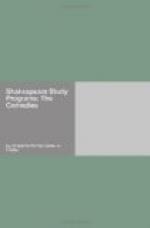THE COMEDIE OF ERRORS
In the Summer of 1594 a translation of a Latin Farce by the Roman Dramatist, Plautus, was made ready for publication in London. It may even have been published then, for, although the title page date is 1595, then, as often now, the issue was made in advance of date. Circulation in Ms., moreover, now unusual, was then common.
This translation was registered, at any rate, for publication, June 16, 1594, as “A Booke entitled Menaechmi, being a pleasant and fine conceited comedy taken out of the most wittie poet Plautus, chosen purposely from out the rest as being the least harmful and most delightful.”
Six months later, Shakespeare had made an English Farce out of this Latin one. He invented several new characters, arranged many new situations, and put a good deal more life-likeness in the relations of the characters, while yet it may be seen that, his new play, “The Comedie of Errors,” was directly drawn from the old one by Plautus.
The first record we have of Shakespeare as an actor before Queen Elizabeth relates to the performance in Christmas week of this same year of “twoe severall comedies.” This record in the Accounts of the Treasurer who paid out the money for the Plays acted before the Queen, runs as follows:
“To William Kempe, William Shakespeare, and Richard Burbage, servaunts to the Lord Chamberleyn upon the Councelles warrant dated at Whitehall xv. die. Marcij 1594 [1595], for twoe severall comedies or enterludes, shewed by them before her Majestie in Christmas tyme laste paste, viz., upon St. Stephen daye, [Dec. 26,] and Innocente’s day, [Dec. 28,] xiii^{li} vi^{s} viij^{d} and by way of her Majesties rewarde vi^{li} xiij^{s} iv^{d} in all xx^{li}.”
It is fair to infer that the “Comedie of Errors” was one of these two comedies, for on the evening of the 28th of December, 1594, there arose a sudden necessity to hire an entertainment to take the place at Gray’s Inn, one of the great Law Schools of London, of a Play by the students which had gone to pieces. In lieu of this amateur play, for which a great stage had been built in their Hall, it is recorded that the great throng assembled were forced, first, to “content themselves with ordinary dancing and revelling, and when that was over, with a Comedy of Errors like to Plautus his Menoechmus, which was played by the players.” That these “players” were public players is shown in the Gray’s Inn account of these Christmas festivities by another reference to this “company of base and common fellows” who were “foisted” in “to make up our disorders with a play of Errors and Confusions.”
Since this substitution of the “players” Play for the Play by the young gentlemen students was unexpected, we can be sure it was not made for this occasion. It seems obvious that whatever comedy was specially designed by Shakespeare and his fellow actors for their Christmas performances before the Queen at Greenwich, would be apt to be chosen for a sudden repetition at Gray’s Inn the same evening. And of course for such an institution of scholarly gentlemen as Gray’s Inn, a farce based on Plautus would be likely to be thought appropriate.




